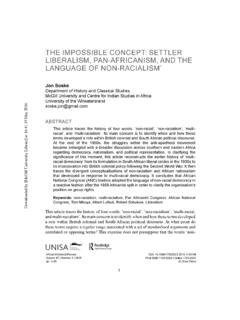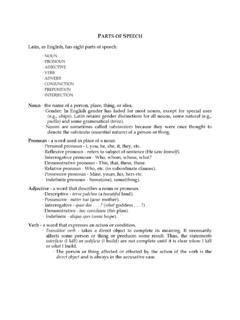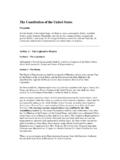Transcription of The Glen Grey Speech - South African History Online
1 The Glen grey Speech A transcription of Cecil John Rhodes Speech on the Second Rereading of the Glen grey Act to the Cape House Parliament on July 30 1894. There is, I think, a general feeling that the natives are a distinct source of trouble and loss to the country. Now, I take a different view. When I see the labour troubles that are occurring in the United States, and when I see the troubles that are going to occur with the English people in their own country on the social question and the labour question, I feel rather glad that the labour question here is connected with the native question, for I see that at any rate we do not have here what has lately occurred in Chicago, where, on account of some question as to the management of the Pullman Car Company, the whole of these labour quarrels have broken out, and the city has been practically wrecked.
2 This is what is going on in the older countries on account of the masses as against the classes getting what they term their rights, or, to put it into plain English, those who have not, trying to take from those who have. If they cannot get it by what might be termed Irish legislation, they mean to get it by physical force. That is another aspect of government by the people. The proposition that I would wish to put to the House is this, that I do not feel that the fact of our having to live with the natives in this country is a reason for serious anxiety. In fact, I think the natives should be a source of great assistance to most of us. At any rate, if the whites maintain their position as the supreme race, the day may come when we shall all be thankful that we have the natives with us in their proper position.
3 We shall be thankful that we have escaped those difficulties which are going on amongst all the ; old nations of the world. Now, it happens that in the rearrangement of the Cabinet I was given the charge of the natives, and, naturally, what faced me was the enormous extent of the native problem. In addition to the natives in i the colony, I am responsible, on this side of the Zambesi, for half a million of natives, and on the other i side of the Zambesi I am responsible for another ; half-million. By the instrumentality of responsible ' government, and also by that of another position which I occupy, I feel that I am responsible for about two millions of human beings. The question which has submitted itself to my mind with regard to the natives is this What is their present state ? I find that they are increasing enormously.
4 I find that there are certain locations for them where, without any right or title to the land, they are herded together. They are multiplying to an enormous extent, and these locations are becoming too small. The Transkei could support, perhaps, its present population of 600,000 people, but it is not able to support double that population. The natives there are increasing at an enormous rate. The old diminutions by war and pestilence do not occur. Our good government prevents them from fighting, and the result is an enormous increase in numbers. The natives devote their minds to a remarkable extent to the multiplica- tion of children. The result is an increase in the population. The problem before us is this What is to become of these people ? I am sure that the Transkei cannot support 1,200,000 people, whilst I know that there will be certainly that number of them in about twenty years.
5 What then do we intend to do ? As I have stated once before in this House, the natives have had in the past an interest- ing employment for their minds in going to war and in consulting in their councils as to war. But by our wise government we have taken away all that employment from them. W e have given them no share in the government and I think rightly, too and no interest in the local development of their country. What one feels is that there are questions like bridges, roads, education, plantations of trees, and various local questions, to which the natives might devote themselves with good results. At present we give them nothing to do, because we have taken away their power of making war an excellent pursuit in its way which once employed their minds. Then there arises the question of their land, which cannot continue to provide enough for all of them.
6 There is not room for them all. In the third place, in many parts of their country we have placed can- teens. The man who has nothing to do turns to the canteen. We do not teach them the dignity of labour, and they simply loaf about in sloth and laziness. They never go out and work. This is what we have failed to consider with reference to our native population. These are my premises. I wish to look at them, not from a philosophical point of view, but from a practical point of view. The natives know nothing about the politics of the country. They have told me time after time that they do not understand these politics. Leave us alone, but let us try and deal with some of our little local questions." That is the common statement they have made to me. I do not know whether the member for Fort Beaufort would agree with me, though I am not trenching upon the question of no vote at present.
7 I feel, too, that if the people desire it the canteens should be removed from their midst. Further, it is our duty as a Government to remove these poor children from this life of sloth and laziness, and to give them some gentle stimulus to come forth and find out the dignity of labour. And then, if I may speak on a general question in the interest of the country, I would say that I have had to face the question of the extraordinary position of the labour problem of the colony. One day I am told that I ought to introduce an irrigation scheme ; then the Malmesbury farmers say I must go into the question of the growth of corn ; and I am told that my country contains in its natural soil the greatest possible capabilities. And yet I find that nothing is done. This, I am told, is owing to the sluggish conservatism of the people.
8 I might say something about this question. So long as I talk about farming, so long as I talk about what we should do, it is all right. But as soon as any one of my own race commences to farm, I can almost prophesy that in three years he will collapse. Slow progress ex- tremely slow progress is made, it is true ; but when I begin to inquire into the reasons for it, I find that the country which grows the greatest quantity of corn is Egypt, at 2d. per diem as the basis of cost of labour. In Nyasaland, where good coffee is produced, wages are 4s. a month, including food i|^d. per diem. It has been stated that it is the laziness of the Western farmer which prevents his producing corn and com- peting, when he has his labour on this basis of at least 2s. 6d. to 3s. per diem as against 2d. per diem in these other parts of the world.
9 I am speaking of those countries which are great grain-producing countries. I have seen what these people live on, and their food is not worse than that of the Kaffir. But the wage of the EngHsh agricultural labourer averages only about 12s. per week, and he lives certainly at a higher standard of civilisation than our raw Kaffir; and yet the Kaffir is paid almost 50 per cent, more than the Englishman. So much for this aspect of the question. Now, as to the Bill itself, I wish to point out that the first clause deals with the question of area. The clause only states Glen grey , but if the House approves of the Bill, I would propose to apply it to other native areas. If the House approves of the Bill, I will certainly apply that clause to Fingoland. Under the clause, individual title will not be given unless the Divisional Council recommends it.
10 The other provisions I would apply to Fingoland, because I would con- sider that with the approval of the second reading I had received the approval of the House. Part i. is simply as to the creation of areas. Glen grey is not suitable in many respects, and it is mixed up with white farmers, and so we have had to reserve in Glen grey those parts of the country which are in the occupation of white farmers. Certain other reasons have had to be considered : the Indwe railway, for instance. What I would like in regard to a native area is that there should be no white men in its midst. I hold that the natives should be apart from white men, and not mixed up with them. There are about three hundred morgen of Glen grey farms which have been already surveyed, which would give about seventy allotments.

















